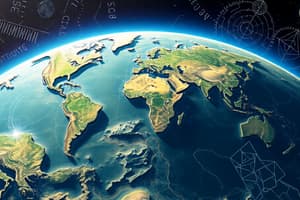Podcast
Questions and Answers
What is a key advantage of using the DMS format for GPS coordinates?
What is a key advantage of using the DMS format for GPS coordinates?
- Historical Context Dating Back to the Babylonians (correct)
- Used Extensively in Computer Applications
- Easy to Read and Understand for Computers
- High Precision in Measurements
Why do computers and GPS devices find it challenging to work with DMS coordinates?
Why do computers and GPS devices find it challenging to work with DMS coordinates?
- Computers Prefer Decimal Degrees (correct)
- Inaccuracy in Reporting
- Historical Significance of DMS
- Ease of Interpretation
In what way are DMS coordinates less precise compared to decimal degrees?
In what way are DMS coordinates less precise compared to decimal degrees?
- Report Only Degrees without Minutes or Seconds (correct)
- Based on a Base-60 Number System
- Include Minutes and Seconds Separated by Commas
- Often Used in Modern Scientific Literature
What makes DMS format widely recognizable and interpretable by people?
What makes DMS format widely recognizable and interpretable by people?
Which group historically employed a base-60 number system reflected in the DMS format?
Which group historically employed a base-60 number system reflected in the DMS format?
Why is the DMS format still used in scientific literature despite its drawbacks?
Why is the DMS format still used in scientific literature despite its drawbacks?
How can DMS coordinates be converted to decimal degrees?
How can DMS coordinates be converted to decimal degrees?
In terms of precision, how does a DMS coordinate with only degrees compare to decimal degrees?
In terms of precision, how does a DMS coordinate with only degrees compare to decimal degrees?
What is the significance of converting DMS coordinates to decimal minutes (DDM)?
What is the significance of converting DMS coordinates to decimal minutes (DDM)?
Why do some software retain DMS coordinates instead of automatically converting to decimal degrees?
Why do some software retain DMS coordinates instead of automatically converting to decimal degrees?
In which contexts do DMS coordinates remain relevant despite being less precise than decimal degrees?
In which contexts do DMS coordinates remain relevant despite being less precise than decimal degrees?
Why is it essential to understand conversion and formatting when dealing with GPS coordinates?
Why is it essential to understand conversion and formatting when dealing with GPS coordinates?
Flashcards are hidden until you start studying
Study Notes
GPS Coordinates in DMS Format
GPS coordinates can be presented in various formats, including the classic degrees-minutes-seconds (DMS) notation. This format, although less common in computer applications, is still used in scientific literature, conversations, and even in some GPS devices.
Advantages and Disadvantages of DMS
Advantages:
- Easy to Read and Understand: DMS format is widely recognized and can be easily interpreted by people without extensive backgrounds in geography or computing.
- Historical Context: DMS is the original format and has been used for centuries, dating back to the Babylonians, who employed a base-60 number system.
Disadvantages:
- Computers Don't Like DMS: Dealing with DMS coordinates in software is difficult because computers and GPS devices prefer decimal degrees.
- Inaccurate: DMS coordinates can be less precise than those in decimal degrees, especially when only the degrees are reported without minutes or seconds.
DMS Format in Detail
DMS coordinates include degrees, minutes, and seconds, separated by periods or spaces. For example,
- 40°34'15"N (latitude)
- 121°47'41"W (longitude)
To convert DMS to decimal degrees, use the following formula:
[DD = Degrees + (Minutes/60) + (Seconds/3600)]
For example, the DMS coordinates 40°34'15"N convert to decimal degrees as:
[40 + (34/60) + (15/3600) = 40.569167]
Precision and Conversion
Confusion can arise when comparing DMS and decimal degrees because decimal degrees can represent a fraction of a second, while DMS uses whole numbers. A DMS coordinate with only degrees, for instance, is precise to about 111 km.
To convert DMS to decimal minutes (DDM), divide the seconds by 60.
Conversion in Software
Many GPS devices, software, and mapping programs automatically convert DMS coordinates to decimal degrees during calculations. However, some software may retain the input as DMS, allowing you to manually convert the coordinates if needed.
In summary, DMS coordinates are a historical format that can be less precise and more difficult to handle in computer applications. However, they remain relevant in scientific and casual contexts. When dealing with GPS coordinates, it's essential to understand conversion and formatting to ensure accurate representation and analysis of locations.
Studying That Suits You
Use AI to generate personalized quizzes and flashcards to suit your learning preferences.




